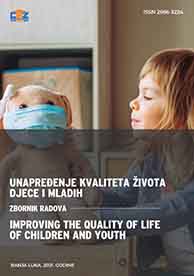PREVENCIJA KAO FAKTOR UNAPREĐENJA KVALITETA ŽIVOTA ZANEMARENE I ZLOSTAVLJANE DJECE U PORODICI
PREVENTION AS A FACTOR OF IMPROVING THE QUALITY OF LIFE OF NEGLECTED AND ABUSED CHILDREN IN THE FAMILY
Author(s): Dragana ŠćepovićSubject(s): Human Rights and Humanitarian Law, Studies in violence and power, Family and social welfare, Victimology
Published by: CENTAR MODERNIH ZNANJA
Keywords: prevention; neglect; abuse; children; family;
Summary/Abstract: Although there are difficulties in giving a generally accepted definition of the term violence against children, most authors agree that the basic forms of violence against children in the family are neglect and physical, psychological and sexual abuse. Social work centers have public authority and duty to protect children, their rights and interests, but also to provide support and assistance to parents, with the aim of improving the quality of life of children in the family. In cases of neglect and abuse of children in the family, the centers intervene with measures of social and family protection and take measures to prevent further violence. Along with social work centers, other protection subjects (police, prosecutors, courts, health and educational institutions), whose task is not only to protect victims and process violence, but also to prevent and combat domestic violence, represent key actors in the implementation of all forms and measures of prevention. In order to build a system and achieve better preventive action, the paper analyses the prevention standards contained in the Council of Europe Convention on preventing and combating violence against women and domestic violence(raising awareness of violence as a social problem, introducing content on violence in educational programs, professional development, sensitization of professionals and their training for inter-sectoral cooperation and preventive work with perpetrators of violence). Considering that preventive activities are not significantly represented within the regular activities of protection subjects, the paper points to their obligations and possibilities of implementing preventive measures at the local level. The implementation of preventive activities, which are aimed at preventing, combating, but also stopping further violence, implies an interdisciplinary approach and multi-sectoral cooperation of all protection subjects. In this sense, special attention is paid to the coordinated action of all subjects involved in the prevention process, which aims to harmonize procedures and activities, and increase the responsibility of all participants.
Journal: DRUŠTVENE DEVIJACIJE
- Issue Year: VI/2021
- Issue No: 6
- Page Range: 11-21
- Page Count: 11
- Language: Bosnian, Croatian, Serbian

